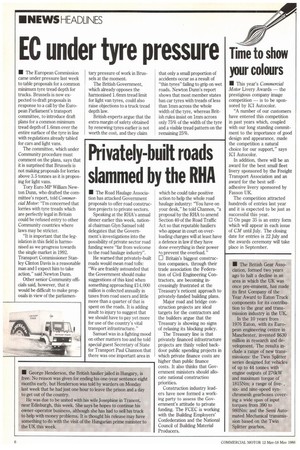Privately-built roads slammed by the RHA
Page 16

If you've noticed an error in this article please click here to report it so we can fix it.
• The Road Haulage Association has attacked Government proposals to offer road construction projects to private sectors.
Speaking at the RHA's annual dinner earlier this week, national chairman Glyn Samuel told delegates that the Government's investigations into the possibility of private sector road funding were "far from welcome to the road haulage industry".
He warned that privately-built roads would mean road tolls: "We are frankly astounded that the Government should make suggestions of this kind when something approaching £14,000 million is collected annually in taxes from road users and little more than a quarter of that is spent on the roads. It is adding insult to injury to suggest that we should have to pay yet more for use of the country's vital transport infrastructure."
Samuel was in a fighting mood on other matters too and he told special guest Secretary of State for Transport Paul Channon that there was one important area in which he could take positive action to help the whole road haulage industry: "You have on your desk," he told Channon, "a proposal by the RHA to amend Section 40 of the Road Traffic Act so that reputable hauliers who appear in court on overloading charges will at least have a defence in law if they have done everything in their power to prevent the overload." El Britain's biggest construction companies, through their trade association the Federation of Civil Engineering Contractors, are becoming increasingly frustrated at the Treasury's reticent approach to privately-funded building plans.
Major road and bridge construction projects are ideal targets for the contractors and the builders argue that the Treasury is showing no signs of relaxing its blocking policy.
The Treasury line is that privately financed infrastructure projects are thinly veiled backdoor public spending projects in which private finance costs are higher than public finance costs. It also thinks that Government ministers should allocate national construction priorities.
Construction industry leaders have now formed a working party to assess the Government's attitude to private funding. The FCEC is working with the Building Employers' Confederation and the National Council of Building Material Producers.
















































































































